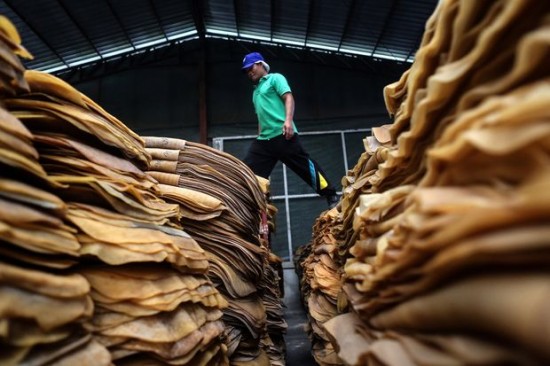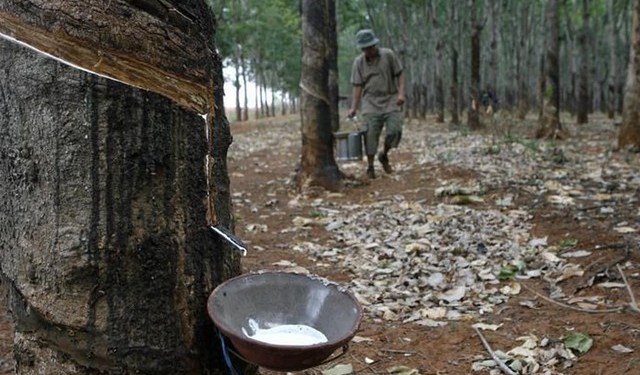The National Council for Peace and Order (NCPO) has approved a budget of 5.94 billion baht for the overhaul of the rubber industry as proposed by the Natural Rubber Policy Committee.

The measures involve maintaining a stock to stabilise prices, improving planters’ liquidity, developing the rubber market and conducting research and development on rubber products, said Winthai Suwaree, an NCPO spokesman.
For the short term of up to 10 years, product prices will be buoyed by increasing market liquidity, adding value and improving quality of products and more lending to rubber operators.
“The NCPO chief is concerned about the rubber problem and stressed the government’s stock must be sold in a manner that doesn’t affect market prices,” Col Winthai said.
“In the short term, more markets must be found and products traded at appropriate prices. In the long term, domestic use should be optimised and a balance between demand and supply must be maintained,” he said.
Representatives of the rubber farmers’ network on Tuesday submitted a letter to Prime Minister Prayuth Chan-ocha to propose measures for their survival.
Gen Prayuth assigned Gen Chatchai Sarikalaya to talk with the representatives and accept the letter.
The six-group network suggested two emergency measures.
Leaders of four groups on May 16 sought an injunction from the Administrative Court to stop the sale of 210,000 tonnes of rubber in the government’s stockpile, saying the move would further push down prices.
Local rubber prices fell from 55.89 baht a kilogramme on Aug 7 to 51.61kg on Aug 18.
The planters recommended the stock be liquidated in February 2015 when there is little tapping activity.
The court issued a temporary injunction but since the second inquiry on Aug 19, the injunction has not been renewed.
Related authorities in charge of the stock argued the sale was necessary to get the money for new supply. The inventory was the result of the previous government’s subsidy which paid the planters 100 baht a kg.
According to their letter, the planters also want a solution to the 210,000-tonne stock.
They urge that all agencies think of how to process or add value to rubber such as adding latex to asphalt in road construction or building playgrounds or futsal field, etc.
The government should also keep track of the quantity and quality of the rubber in its stock, kept to stabilise prices.
Since production cost is 65.25 baht a kg at present, the government should continue to subsidise their farm essentials costs for another season at the rate of 2,520 baht a rai, but not more than 25 rai each, they said.
In the medium term, the farmers want a restructuring of the Thai rubber market so it can be used as reference prices for Asean and the world instead of foreign futures markets.
The planters should also take part in making rubber products while the government can help in terms of financing and marketing.
They also want the government to approve a revolving fund worth 10 billion baht for stockpiling and 5 billion baht in credit for processing rubber.
“As a centre of Asean, Thailand should host a regional conference among the seven producing countries to set regional strategies,” they said.
The planters also want to set up a fund to stabilise prices across Asean, which makes up 80% of world rubber output.
“The ultimate goals are to make Asean prices the world’s reference prices and to stabilise rubber prices by keeping a stock of 1 million tonnes,” it said.
The supply could be added to the stock when prices are below cost and sold when they returns to normal.
In addition to the network, rubber planters nationwide have turned to the new prime minister for help after the prices dropped below costs.
In Nakhon Si Thammarat, 10 representatives of the farmers’ council of the southern province sent a letter to Gen Prayuth through governor Apinant Suethanuwong at the provincial hall on Tuesday morning.
Prateep Kleepkaew, chairman of the local farmers’ council, said that about 100,000 families of rubber growers in the province were in deep trouble.
“The rubber price is much lower than production costs. The families of rubber growers lack money to maintain their living and their everyday life is depending on bank loans and loan sharks,” Mr Prateep said.
Governor Apinant received the letter and promised to forward it to Gen Prayuth.
In Trang, the Bank of Agriculture and Agricultural Cooperative (BAAC) is speeding up payments under the farm essentials subsidy programme.
BAAC Trang director Panumas Tunnsu said planters should look for extra incomes and apply the sufficiency economy principle.
Some 58,000 planters registered in the programme of whom 12,630 were paid by the BAAC.
However, most of their documents are either redundant or incomplete, causing payment delays.
The Yingluck Shinawatra government approved a subsidy for farm essentials at 2,520 baht a rai. The BAAC has already paid 1.27 billion baht under the programme.
Since most rubber planters are small with an average plantation of 10 rai a household and production of 264 kg a year, they earn more than 100,000 baht a year. It is therefore imperative that they find extra jobs and apply the sufficiency economy principle.
– Bangkok Post


























